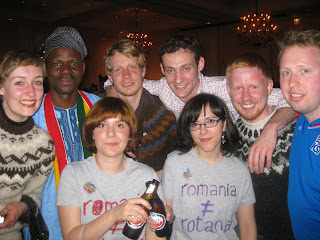 A few weeks ago, I had the opportunity to travel to Washington D.C. to compete in the Philip C. Jessup International Law Moot Court Competition. Joined by students on over 100 teams from 80 countries, it was truly an incredible experience shared by all.
A few weeks ago, I had the opportunity to travel to Washington D.C. to compete in the Philip C. Jessup International Law Moot Court Competition. Joined by students on over 100 teams from 80 countries, it was truly an incredible experience shared by all.The Jessup Competition originated at Harvard Law School in 1960, with American students arguing against foreign LLM students on the topic of Cuban Agrarian Reform. The Competition quickly internationalized, and now over 120 countries and special jurisdictions have sent teams to participate. It is currently administered by the International Law Students Association (ILSA).
Use of force in response to international terrorism was the subject of this year’s problem. Set around a series of attacks that spawned the victim nation to violate the territorial sovereignty of a neighboring state to apprehend the suspects, later subjecting them to detention
 and questionable treatment, and ultimately trial by military commission, the questions were challenging to say the least. Students considered the interplay between humanitarian and human rights law -- testing the bounds and applicability of the Geneva Conventions to terrorist activities, as well as the reach of the Convention Against Torture and the International Covenant on Civil and Political Rights.
and questionable treatment, and ultimately trial by military commission, the questions were challenging to say the least. Students considered the interplay between humanitarian and human rights law -- testing the bounds and applicability of the Geneva Conventions to terrorist activities, as well as the reach of the Convention Against Torture and the International Covenant on Civil and Political Rights.I had the pleasure of facing off against teams from Iceland, India, Mexico, and the United States. I especially respect the international teams for arguing flawlessly in English, which for many of them is a second (or third or fourth) language. The two finalist teams in this year’s competition were Case Western Reserve University of the United States and the University of New South Wales of Australia. Both teams, each of which fielded one female oralist, argued beautifully. In a close decision, Case Western won the Jessup Cup.
The Jessup is more than a moot court competition, however. It is a wonderful way to meet students and practitioners from every corner of the globe interested in international law. To this end, the Jessup provides ample social events, including the “Go National Ball” to which attendees come dressed in their traditional national attire, parties in D.C. clubs, and a formal
 gala at the close of the event. By the end of the week, I think it’s safe to say we were all friends and colleagues, not competitors.
gala at the close of the event. By the end of the week, I think it’s safe to say we were all friends and colleagues, not competitors.Participants were also invited to attend the ILSA and ASIL conferences that were held during the same week – a great way to learn about the hottest issues in international law.
Jessup participants tend to be a loyal, if not a fanatical bunch. “Friends of the Jessup” describe the experience as creating a “fraternity of legal professionals, new and old, converged to build bonds and share an invaluable cultural and academic exchange.” I have to say I agree. Groups are popping up all over Facebook with themes like “Free Samara Penza” (the fictional leader of the alleged terrorist organization in this year’s problem). I am online “friends” with hundreds of other Jessup participants.
But perhaps the most important take-away from this year’s competition is that there are now thousands of soon-to-be practicing attorneys all over the world well-versed in the legal issues surrounding the War on Terror. This new generation of lawyers, although from incredibly diverse backgrounds and with divergent political views, are competent to uphold the rule of
 international law, despite the threats each of their nations may face. Irrespective of competition results, that in itself is a huge achievement.
international law, despite the threats each of their nations may face. Irrespective of competition results, that in itself is a huge achievement.



